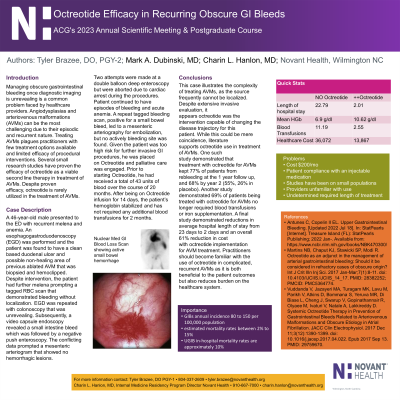Monday Poster Session
Category: GI Bleeding
P2088 - Octreotide Efficacy in Recurring Obscure GI Bleeds
Monday, October 23, 2023
10:30 AM - 4:15 PM PT
Location: Exhibit Hall

Has Audio

Tyler Brazee, DO
Novant Hospital New Hanover Regional Medical Center
Wilmington, NC
Presenting Author(s)
Tyler Brazee, DO1, Charin Hanlon, MD2, Mark Dubinski, MD2
1Novant Hospital New Hanover Regional Medical Center, Wilmington, NC; 2Novant Hospital, Wilmington, NC
Introduction: Managing obscure GI bleeds once diagnostic imaging is unrevealing is a common problem faced by healthcare providers. Arteriovenous malformations (AVMs) can be the most challenging due to their episodic and recurrent nature. Treating AVMs plagues practitioners with few treatment options available. Several small research studies have proven the efficacy of octreotide as a viable second line therapy in treatment of AVMs. Despite proven efficacy, octreotide is rarely utilized in the treatment of AVMs.
Case Description/Methods: A 46-year-old male presented to the ED with recurrent melena. An EGD was performed and found a duodenal ulcer that was hemoclipped. Despite intervention, patient had further melena prompting a tagged RBC scan that demonstrated bleeding without localization. EGD was repeated with colonoscopy that was unrevealing. Video capsule endoscopy revealed a small intestine bleed followed by a negative push enteroscopy. Conflicting data prompted a mesenteric arteriogram that showed no hemorrhagic lesions. Two attempts were made at a double balloon deep enteroscopy but were aborted due to cardiac arrest during the procedures. A repeat tagged RBC scan, positive for a small bowel bleed, led to a mesenteric arteriography, but no bleeding was found. As patient was too high risk for further invasive procedures, he was placed on Octreotide. Prior to starting Octreotide, he received 43 units of blood over the course of 20 months. After being on Octreotide for 14 days, he has not required any additional blood transfusions for 10 months.
Discussion: This case illustrates the complexity of treating AVMs, as the source frequently cannot be localized. Despite extensive invasive evaluation, it appears octreotide was the intervention capable of changing the disease trajectory for this patient. While this could be mere coincidence, literature supports octreotide use in treatment of AVMs. One study demonstrated that treatment with octreotide for AVMs kept 77% of patients from rebleeding at 1 year follow up, and 68% by year 2. Another study demonstrated 69% of patients being treated with octreotide for AVMs no longer required blood transfusions. A final study demonstrated reductions in average hospital length of stay from 23 days to 2 days and an overall 61% reduction in cost with octreotide implementation for AVM treatment. Practitioners should become familiar with the use of octreotide in complicated, recurrent AVMs as it is beneficial to patient outcomes and reduces burden on the healthcare system.
Disclosures:
Tyler Brazee, DO1, Charin Hanlon, MD2, Mark Dubinski, MD2. P2088 - Octreotide Efficacy in Recurring Obscure GI Bleeds, ACG 2023 Annual Scientific Meeting Abstracts. Vancouver, BC, Canada: American College of Gastroenterology.
1Novant Hospital New Hanover Regional Medical Center, Wilmington, NC; 2Novant Hospital, Wilmington, NC
Introduction: Managing obscure GI bleeds once diagnostic imaging is unrevealing is a common problem faced by healthcare providers. Arteriovenous malformations (AVMs) can be the most challenging due to their episodic and recurrent nature. Treating AVMs plagues practitioners with few treatment options available. Several small research studies have proven the efficacy of octreotide as a viable second line therapy in treatment of AVMs. Despite proven efficacy, octreotide is rarely utilized in the treatment of AVMs.
Case Description/Methods: A 46-year-old male presented to the ED with recurrent melena. An EGD was performed and found a duodenal ulcer that was hemoclipped. Despite intervention, patient had further melena prompting a tagged RBC scan that demonstrated bleeding without localization. EGD was repeated with colonoscopy that was unrevealing. Video capsule endoscopy revealed a small intestine bleed followed by a negative push enteroscopy. Conflicting data prompted a mesenteric arteriogram that showed no hemorrhagic lesions. Two attempts were made at a double balloon deep enteroscopy but were aborted due to cardiac arrest during the procedures. A repeat tagged RBC scan, positive for a small bowel bleed, led to a mesenteric arteriography, but no bleeding was found. As patient was too high risk for further invasive procedures, he was placed on Octreotide. Prior to starting Octreotide, he received 43 units of blood over the course of 20 months. After being on Octreotide for 14 days, he has not required any additional blood transfusions for 10 months.
Discussion: This case illustrates the complexity of treating AVMs, as the source frequently cannot be localized. Despite extensive invasive evaluation, it appears octreotide was the intervention capable of changing the disease trajectory for this patient. While this could be mere coincidence, literature supports octreotide use in treatment of AVMs. One study demonstrated that treatment with octreotide for AVMs kept 77% of patients from rebleeding at 1 year follow up, and 68% by year 2. Another study demonstrated 69% of patients being treated with octreotide for AVMs no longer required blood transfusions. A final study demonstrated reductions in average hospital length of stay from 23 days to 2 days and an overall 61% reduction in cost with octreotide implementation for AVM treatment. Practitioners should become familiar with the use of octreotide in complicated, recurrent AVMs as it is beneficial to patient outcomes and reduces burden on the healthcare system.
Disclosures:
Tyler Brazee indicated no relevant financial relationships.
Charin Hanlon indicated no relevant financial relationships.
Mark Dubinski indicated no relevant financial relationships.
Tyler Brazee, DO1, Charin Hanlon, MD2, Mark Dubinski, MD2. P2088 - Octreotide Efficacy in Recurring Obscure GI Bleeds, ACG 2023 Annual Scientific Meeting Abstracts. Vancouver, BC, Canada: American College of Gastroenterology.
